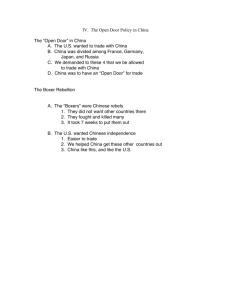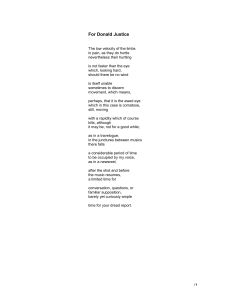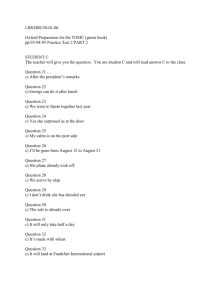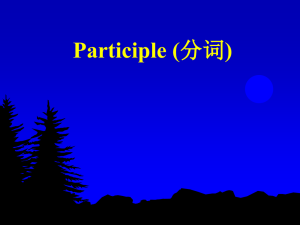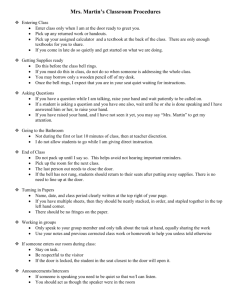The door by miroslav holub poem and notes
advertisement
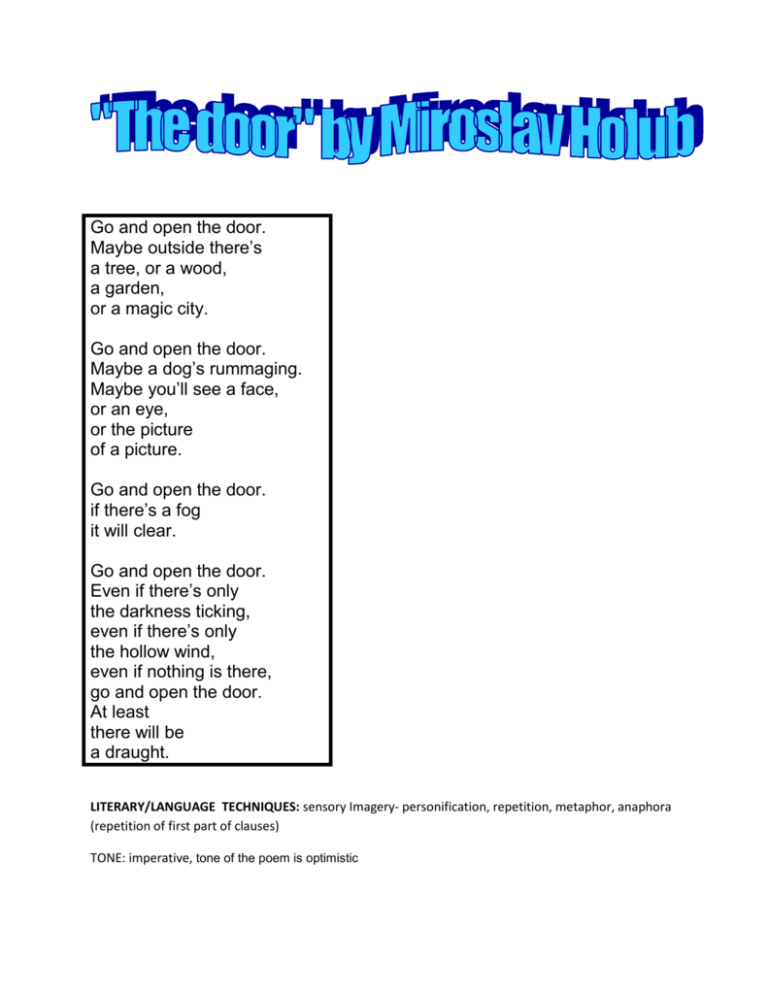
Go and open the door. Maybe outside there’s a tree, or a wood, a garden, or a magic city. Go and open the door. Maybe a dog’s rummaging. Maybe you’ll see a face, or an eye, or the picture of a picture. Go and open the door. if there’s a fog it will clear. Go and open the door. Even if there’s only the darkness ticking, even if there’s only the hollow wind, even if nothing is there, go and open the door. At least there will be a draught. LITERARY/LANGUAGE TECHNIQUES: sensory Imagery- personification, repetition, metaphor, anaphora (repetition of first part of clauses) TONE: imperative, tone of the poem is optimistic Main ideas: the door I thought was a barrier to change-- the door as a vehicle for immeasurable success. change, even if it is mundane (the draught), is better than remaining stagnant in life What does the image of the door represent and symbolize? The door is a barrier between one’s every day life and something new. It is an idea where one is stepping out of their comfort zone. How does the poem present a point of view on the concept of change? This is saying how some people are really afraid of the concept of something new and unknown. For some people, the door represents impossibility. Holub challenges this view and presents an alternative viewpoint: the door can be an agent of change. How does the poem develop your own view and experiences of change? It does make me more curious and want to experience new things. This poem shows how a lot of humans, even if their comfort zone is empty and blank, will not want to leave their limited world The repetition of insisting to open the door encourages the reader to go on, accept change, but if nothing has changed, “at least there’ll be a draught”. A closed door can be a barrier, a symbol of things that keep us confined and limited as individuals. By opening the door we remove those barriers and are introduced to possibilities Thus the door can be perceived as both an entry and an exit The door can be seen as a dual metaphor for what restricts us (our own thinking, perceptions, physical limits etc.) as well as being a gateway to opportunity and change. Yet the poem reminds us that there are no certainties when we open the door, just varied opportunities which are then listed and range from the common and ordinary (“a tree”, “a dog’s rummaging”) to the fantastic and abstract (“a magic city”, “the picture of a picture”). CHANGE: The change may be subtle like “the hollow wind”, or as confronting as the stark “eye”, or unexpected like the “magic city”, or a new perspective through “the picture/ of a picture. But all encompass the notion of change: that which may alter us, our world or give us a new perspective. positive force. Even “if there’s a fog” when we open the door, an obstacle or difficulty, and things at first lack clarity, or we feel uncertain, the poem reassures the reader that “it will clear”. there is still benefit in experiencing whatever we find, no matter how insignificant or momentous. It is the attempt that matters. ABOUT THE POET: MIROSLAV HOLUB Miroslav Holub (13 September 1923 Plzeň – 14 July 1998) was a Czech poet and immunologist. His work was heavily influenced by his experiences as an Immunologist, writing many poems using his scientific knowledge to poetic effect. His work is almost always unrhymed, so lends itself easily to translation. It has been translated into more than 30 languages and is especially popular in the English-speaking world. Although one of the most internationally well-known Czech poets, his reputation continues to languish at home. It was a phenomenon that Miroslav Holub, the late great Czech poet, was familiar with both in a scientific sense (he was leading immunologist) and in terms of his artistic view of the world. A Czech by birth, Holub was born in Pilsen, West Bohemia. During his life, his country metamorphosed through invasion and war, suffering the successive tyrannical rule of the Nazis and the Communists. Conscripted as manual labour under the Third Reich, he was a censored "nonperson" under the Soviets and finally something approaching a national institution in the free Czech Republic. If ever there were a witness to history, it was Holub. "I prefer to write for people untouched by poetry…I would like them to read poems in such a matter-of-fact manner as if they're reading the newspaper or at a football match," he once wrote, outlining his own personal creed. His was a simple but surprisingly rare quality in an artform whose practitioners are too often seen, and see themselves, as gatekeepers of some obscure bastion of knowledge. Sure he dealt in fairly esoteric subjects with a great deal of symbolism but he did so in the most free, reachable way possible. Holub was one who opened the backdoors and ushered the world in, one of the ones who might just have saved poetry from the poets. Holub wrote inspite of, and to spite, the governing system and ideology. Told to think within the boundaries of the official Socialist Realist thought (or unthought), he dissented by thinking about anything and everything. In his mind, escape was a form of subversion and vice versa. Bibliography. “Miroslav Holub”. Wikipedia article. Accessed March 03 2012 on http://en.wikipedia.org/wiki/Miroslav_Holub Dogmatika.com Accessed March 03, 2012 on http://dogmatika.com/dm/features_more.php?id=3281_0_5_0_M
